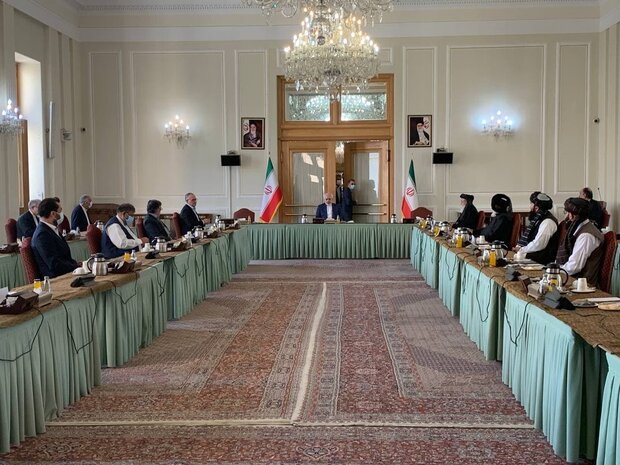Stating that holding an intra-Afghan meeting in Tehran was not a sudden issue and has a long history, Rasoul Mousavi said, "In 2016, when Afghanistan's current foreign minister, Hanif Atmar, was the country's national security adviser, traveled to Tehran and asked Iran for help in negotiating with the Taliban."
"At that time, at the request of the Afghan side, Iran contacted the Taliban and they agreed to peace talks. Mr. Shamkhani then traveled to Kabul, where he held talks with Mr. Hamdullah Mohib, then Afghanistan's national security adviser, and conveyed the Taliban's message of readiness to hold talks. During that trip, the Afghan government was supposed to inform us of its decision to hold talks, but unfortunately, it was not followed up," he added.
Mousavi went on to say, "According to our information, the United States prevented the formation of these intra-Afghan talks; At that time, the Americans had a different view of the Afghan reality, and due to the strategic alliance with the Afghan government, they thought they were ruling over Afghanistan and did not allow the Afghan government to do anything that was against their interests."
Stating that the United States at the time considered peace talks between the Taliban and the government to be to its detriment, the Iranian diplomat said, "This was while Iran wanted to help both sides with these negotiations."
"Therefore, the idea of intra-Afghan talks is not a new idea and it is based on the will of the Afghan side; But unfortunately, the Americans prevented the formation of these negotiations in those years with their actions," he added.
Regarding the prospects of intra-Afghan talks in Tehran, despite the current situation in Afghanistan, he said, "Several trends have been raised about the situation in Afghanistan; The Americans are leading the Doha process, and the Moscow process is in the form of the P3+1. An initiative was supposed to be formed in Istanbul, but it did not materialize. The United Nations has another initiative in the form of 6+2 that does not have a clear destiny."
"The current situation in Afghanistan is due to the implementation of the US plan. They did not seek peace; Rather, they only wanted to withdraw from the war, regardless of what might happen in Afghanistan," Mousavi added.
Emphasizing that Iran has always stated that the withdrawal of the occupiers from Afghanistan should be done responsibly and that a sudden withdrawal should not create a power vacuum, the diplomat said, "Structures had to be created that could maintain the security order of the country. In addition, they were to form an intra-Afghan dialogue that would resolve the situation peacefully, along with the structures created. But the Americans and the occupiers ignored these issues, and as a result, the current situation in Afghanistan was created. In such a situation, Tehran Initiative was proposed and, according to its history, it became operational."
Mousavi pointed to article 6 of the Tehran Intra-Afghan Summit's statement, saying, "The Taliban and the representatives of the Afghan government gathered in Tehran and came to the conclusion that war is not the solution and that a political solution must be found. They condemned violence and attacks on homes, public places, hospitals and mosques, and concluded that they needed to find a solution in a more comprehensive consultation on the future of Afghanistan's political system."
"However, in the published document, they announced that they are going to hold the talks again in Tehran after consulting with high-ranking authorities; Therefore, we do not see the Tehran summit as an ended meeting, but a process that can solve Afghanistan's problems if maintained," the diplomat highlighted.
"In any case, what is important for us as Afghanistan's neighbor is peace and tranquility in this country. Security, peace and tranquility in Afghanistan directly affect our national security, and we must work to prevent the formation of a new civil war in this country and play our role for its peace and stability," he added.
Elsewhere in his remarks, regarding the spread of internal conflicts in Afghanistan to the border with Iran, Mousavi said that Iran's borders are the redline. "We hold the Afghan government accountable for border security issues, and if anything happens at the border, it must be resolved through local and regional mechanisms and in accordance with international principles and law."
ZZ/5257567
